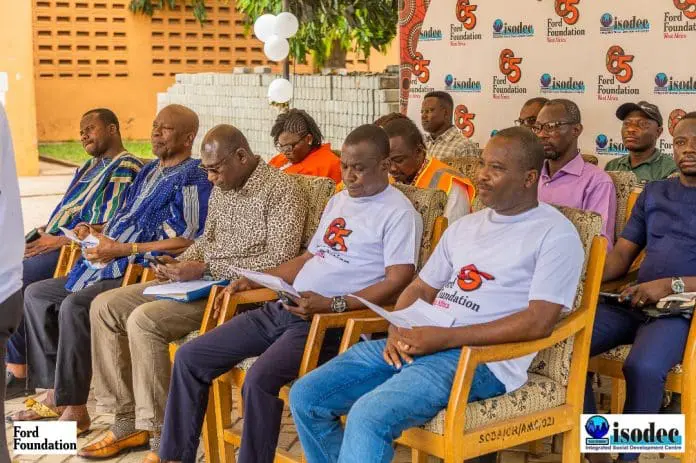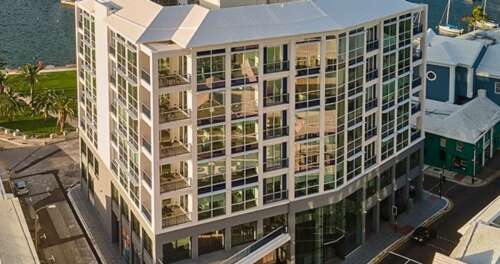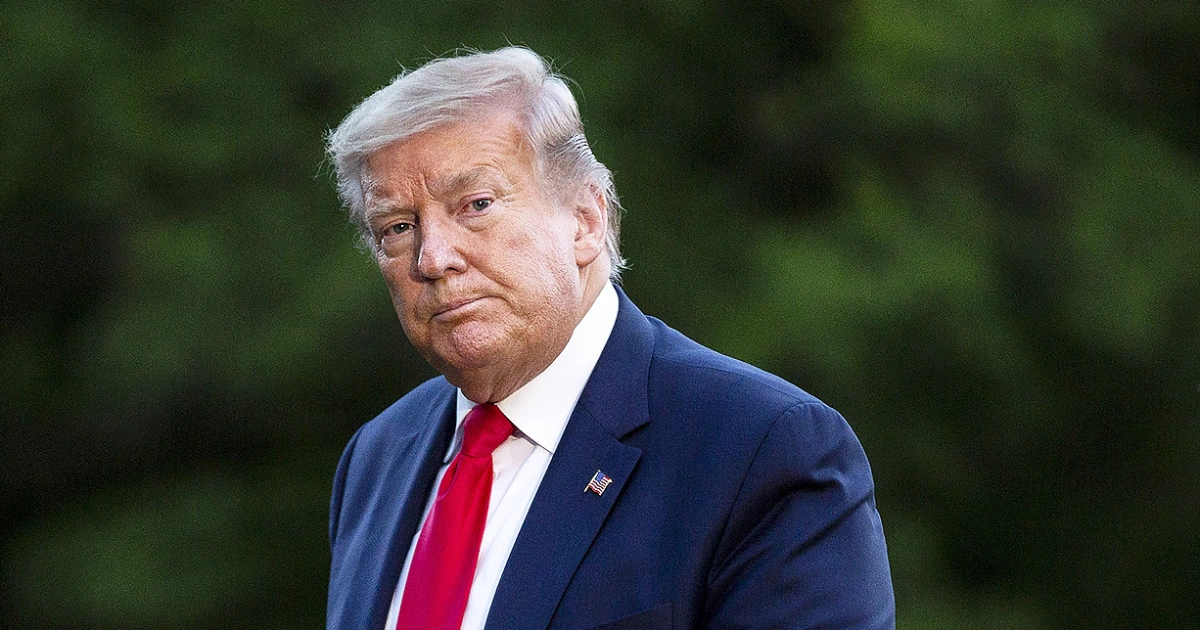Copyright ghananewss

Residents of Shai Osudoku District poured into the streets last Tuesday to celebrate six and a half decades of Ford Foundation work in West Africa, planting trees and hosting a durbar that brought together chiefs, schoolchildren, and civil society leaders under the theme “From Nation Building to Social Justice.” The October 22, 2025 celebration, organized by the Integrated Social Development Centre in collaboration with the Shai Osudoku District Assembly, marked 65 years since Ford Foundation opened its West Africa office in Nigeria in 1960. The commemorative event featured tree planting exercises within the premises of the Shai Osudoku District Assembly in Dodowa, with participation from the Forestry Commission and other stakeholders. Ignatius Godfred Dordoe, District Chief Executive of Shai Osudoku District Assembly, described it as a privilege to host celebrations honoring the Foundation’s achievements across Ghana and West Africa in social justice and philanthropy. His address, read on his behalf, noted that for six and a half decades, the Foundation’s work has resonated throughout West Africa and within local communities, championing governance and social justice without boundaries. The Ford Foundation opened its doors in Nigeria in 1960 and made its first grant in the region in 1958, initially focusing on building institutions in newly independent states through recruitment and training of public service leaders and economic planning experts. Throughout the 1960s, the Foundation supported staff development at universities and training of public servants, academics, and civil society leaders, eventually founding the key institution that introduced the Green Revolution to Nigeria. Bernard Anaba, Head of Policy and Programmes at ISODEC, revealed that his organization crossed paths with Ford Foundation in 2014 and has maintained an enduring partnership in the areas of environment, natural resources, and social justice. He described Ford Foundation’s philanthropic achievements in education, democratic and natural resources governance, environment, climate change, social justice, and gender as worth celebrating. The numbers behind Ford Foundation’s West African presence tell a compelling story. Since making its first grant in the region, the Foundation has invested nearly 285 million dollars to support visionary people across West Africa focused on strengthening democracy, according to data from the Foundation’s 50th anniversary celebrations in 2010. The organization committed 280 million dollars to the International Fellowships Program supporting thousands of graduate and postgraduate scholars from Africa, Asia, Latin America, and the Middle East, along with an additional 150 million dollars for the Partnership for Higher Education particularly in Africa. More recently, the Foundation pledged 420 million dollars over five years to tackle gender inequality and address growing gender based violence in societies. That support reinforces what advocates call a care based economy, increases workplace equality for women, and brings critical resources to women’s rights organizations around the world, positioning gender justice as central to the Foundation’s contemporary agenda alongside its historical emphases on education and governance. Anaba characterized Ford Foundation as the tap root of civil society organizations in Africa, with CSOs serving as branches extending the Foundation’s support into communities and lives of marginalized populations. That metaphor captures dependence relationships that raise questions about sustainability if Foundation priorities shift or funding decreases, though it also acknowledges the genuine impact of resources that have flowed through partner organizations for decades. The symbolic tree planting exercise reinforced that biological metaphor while addressing environmental concerns. Dordoe noted that Dodowa has a rich historical heritage aligned with Ford Foundation values, particularly regarding environment and culture. The Dodowa forest has been a popular folklore phrase in Ghana and West Africa for many years, representing not only cultural significance but environmental stewardship and agricultural heritage. That heritage faces threats from illegal logging, mining, and practices that endanger livelihoods, health, children’s futures, and humanity’s future, according to Dordoe. He framed tree planting as fighting environmental degradation, noting that trees symbolize resilience, community, and life while serving as the lungs of our planet. The trees planted during the celebration represent hope, growth, and what organizers hope will be enduring legacy of the Foundation’s investment in social, economic, political progress, and environmental sustainability. The celebration’s emphasis on environmental themes reflects evolution in Ford Foundation priorities over 65 years. Early work concentrated on institution building and capacity development in newly independent nations. The 1970s saw foundation grantees on frontlines of agricultural and rural development work. In the 1980s, partners focused on maternal and child health and women’s rights. The 1990s brought emphasis on human rights and HIV/AIDS response. Over the past decade, themes have led to current focus on transparency in government, economic development through entrepreneurship, and increasingly, environmental sustainability and climate justice. Ford Foundation’s West Africa office, based in Lagos, Nigeria, represents one of ten regional offices the Foundation maintains across Africa, Asia, Latin America, and the Middle East. With a global endowment of 16 billion dollars and headquarters in New York, the Foundation positions itself as an independent organization working to address inequality and build a future grounded in justice. For nearly 90 years since its 1936 establishment, it has supported what it characterizes as visionaries on frontlines of social change worldwide. The majority of Ford Foundation grants in West Africa, about 60 percent annually, support projects in Nigeria as the most populous African country and economic engine of the region. But the Foundation also funds regional projects that strengthen integration across West Africa, with grantees in Ghana, Senegal, and other countries receiving support for work aligned with Foundation priorities around democratic values, poverty reduction, international cooperation, and human achievement. The Shai Osudoku celebration brought together diverse stakeholders including chiefs, community members, opinion leaders, civil society representatives, policymakers, and media members, reflecting the Foundation’s emphasis on multi sectoral partnerships. That convening approach, bringing together different constituencies around shared goals, characterizes much of Ford Foundation’s work globally as it seeks to catalyze broad coalitions rather than simply funding individual organizations. Whether 65 years of Ford Foundation presence in West Africa has transformed the region as dramatically as supporters claim or created dependencies that undermine local agency as critics sometimes argue remains contested. The Foundation’s nearly 285 million dollars in regional investments since 1958 represents substantial resources, though measuring social change impact proves notoriously difficult given multiple contributing factors and long time horizons before effects fully manifest. For ISODEC and other Ghanaian civil society organizations, Ford Foundation partnership has enabled work on issues from natural resources governance to gender justice that might otherwise struggle for funding. The Foundation’s willingness to support advocacy and policy work, not just service delivery, distinguishes it from donors who avoid anything perceived as political. That creates space for organizations to challenge power structures and advocate for systemic changes rather than simply addressing symptoms. The celebration’s location in Shai Osudoku District, rather than Accra or another major urban center, reflects Ford Foundation’s attention to rural and marginalized communities alongside work in capital cities and economic hubs. Dodowa’s historical significance and environmental heritage made it fitting venue for commemorating a foundation that increasingly emphasizes climate justice and environmental sustainability as core priorities alongside traditional emphases on democratic governance and economic development.



